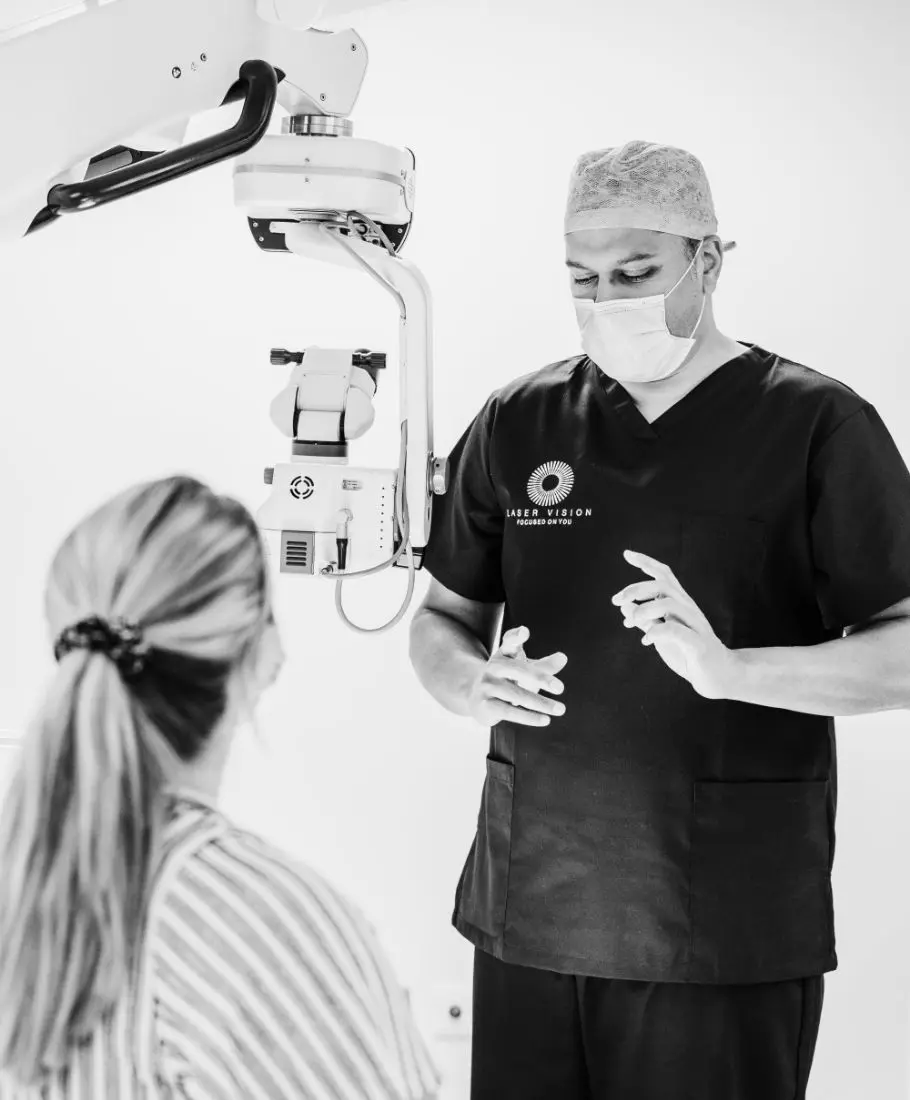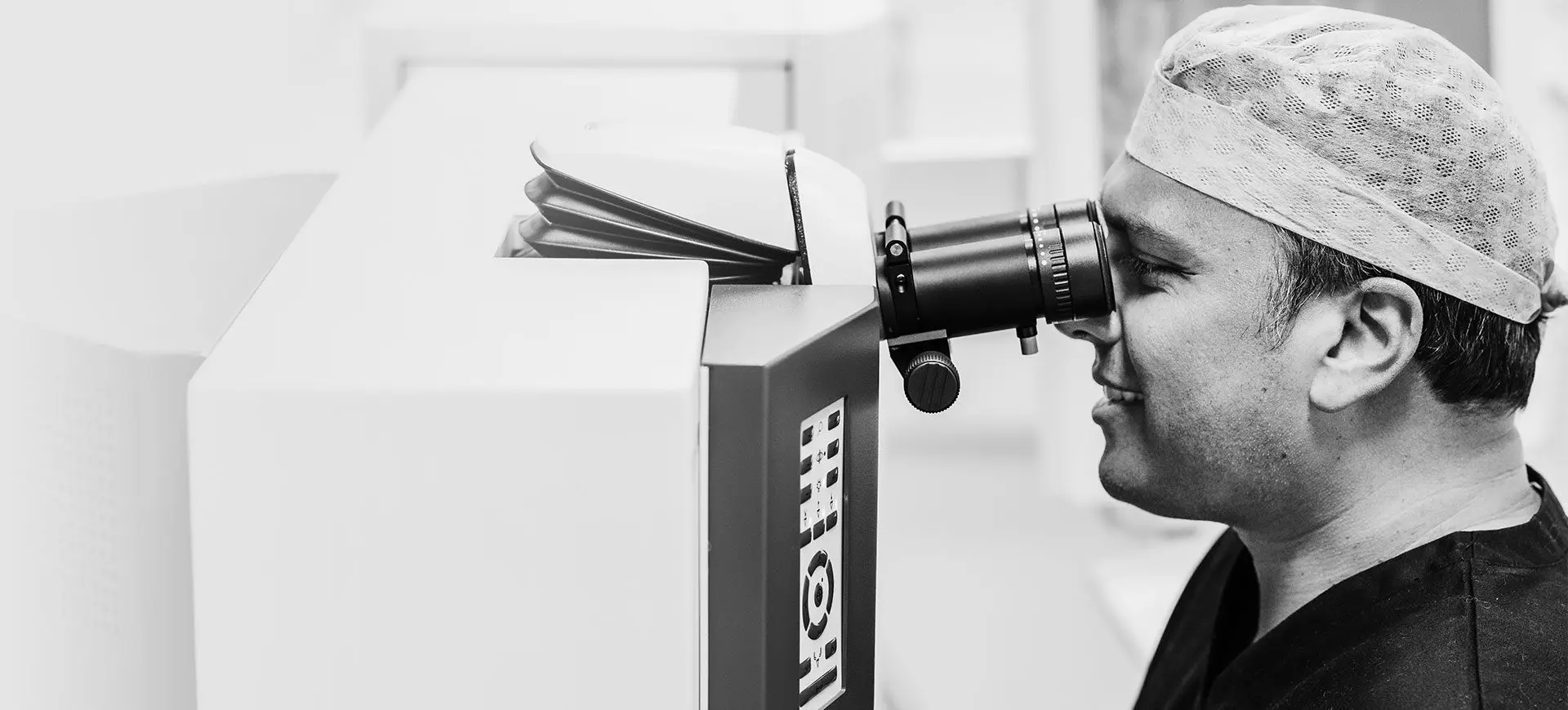Treatments
Refractive Lens Exchange
The most suitable vision correction option for patients over 40 is Refractive Lens Exchange. This is a particularly good choice for patients whom have lost the ability to accommodate the need for glasses to read as well as see in the distance.
Lens implant surgery (also called refractive lens exchange) is a surgical procedure to remove the natural lens of the eye and replace it with personalised lenses, which provide the best and most accurate correction for a patient’s vision. The new lenses are either mono-focal, multi-focal or pseudo-accommodative intra-ocular lens implant (IOL). Replacement lens exchange can deliver multi-focal vision, meaning that following treatment, patients may have clear vision up close, at intermediate distances and at far distance. It may eliminate the need for bifocals or reading glasses.
The procedure is a more advanced form of cataract surgery as the lens inserted is more technologically superior and the results more accurate. The procedure usually takes less than 10 minutes to do under a local anaesthetic, and is painless. There is usually a rapid recovery of vision.
Book a Consultation
At a glance
Treatment Time
1 hour
Treatment Anaesthesia
Eye drops
Treatment Downtime
Discussed at consultation
Treatment Frequency
Permanent
Treatment Results
Improved vision

Treatment
Frequently asked questions
What happens during my consultation?
The consultation is the pivotal in the key to success of surgery and meticulous planning is paramount. Mr Jayaswal and his team will perform a series of measurements including refraction, corneal topography, optical aberrometry and biometry. He will then examine your eye and talk to you in detail about your visual requirements and your aspirations. The aim is to provide a bespoke solution to each person best suited to their current status and their wishes, where possible.
The choice of procedure and lens is based on a number of factors including your age, eye condition, eye health as well as your lifestyle and visual needs. All issues, including alternatives to treatment, the risks and benefits of the procedures available, general or specific to you will be discussed with you in detail, This process can take a while depending on how quickly test results are obtained, so please be prepared to spend 90 minutes at the clinic.
What happens during the Refractive Lens Exchange procedure?
The procedure is carried out at your chosen hospital as a day case procedure. In the interests of safety, one eye is treated at a time. You will be admitted to your own private cubicle, where Mr Jayaswal will come and see you beforehand to have a short chat before proceeding.
Lens Implant Surgery involves replacing your natural lens with a specially chosen artificial lens. It is carried out under a local anaesthetic (a general anaesthetic can be arranged in the rare instances that it is felt to be preferable) and you will be in the hospital for 2-4 hours, although the procedure only takes about 10 minutes on average.
The first 2 minutes of the procedure involves the use of the Ziemer Z8 femtosecond laser. Introduced to the UK by Mr Jayaswal, the laser performs several key steps of the surgery 1/1000thmm accuracy – thereby offering unprecedented levels of safety and precision.
Your natural lens is removed by a small ultrasonic probe via a 2mm opening in the edge of the cornea. This opening is made with the laser so the whole procedure is bladeless. The natural lens membrane, which is clear, is left behind, and the new lens is placed into this membrane ‘bag”.
What are the post procedure considerations?
Recovery from surgery is usually rapid. Eye drops are required for a few weeks afterwards, and a check-up is usually scheduled in the first week or so after surgery.
Price
From £ 3938
Testimonials
What our patients say...
I am truly delighted with the service I have received with LaserVision. Everything was very well explained. My vision is now fantastic and no more glasses or contact lenses! Thank you all
Patient, Manchester Royal Eye Hospital
Dear Rakesh, Thank you so much for all your help and guidance. Your knowledge and expertise has been invaluable. Both myself and my family are enormously grateful for this life changing procedure.
Patient, Nuffield Health Guildford Hospital
Treatments
Related Treatments
Treatment
LASEK
The LASEK procedure involves preserving the extremely thin epithelial layer
View Treatment

Treatment
LASIK
LASIK has become most common form of laser vision correction in the world.
View TreatmentTreatment
Implantable Contact Lens
The use of an additional lens can be a very good alternative to LASIK
View Treatment

Treatment
LASEK
The LASEK procedure involves preserving the extremely thin epithelial layer
View Treatment
Treatment
LASIK
LASIK has become most common form of laser vision correction in the world.
View Treatment
Treatment
Implantable Contact Lens
The use of an additional lens can be a very good alternative to LASIK
View Treatment